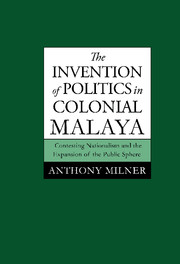 The Invention of Politics in Colonial Malaya
The Invention of Politics in Colonial Malaya Book contents
- Frontmatter
- Contents
- Preface
- Map of Malaya
- Introduction: Colonialism, Nationalism and Contest
- 1 The Ancien Régime: Described and Condemned
- 2 Establishing a Liberal Critique
- 3 A Description of the Real World: Expanding Vocabularies
- 4 Conceptualizing a Bangsa Community: A Newspaper of Moderate Opinions
- 5 Building a Bourgeois Public Sphere
- 6 Ideological Challenge on a Second Front: The Kerajaan in Contest with Islam
- 7 Answering Liberalism: Islamic First Moves
- 8 Kerajaan Self-reform: Chronicling a New Sultanate
- 9 Practising Politics in the Mid-Colonial Period
- 10 Surveying the Homeland: Sedar and Dialogic Processes
- Conclusion: The Malay Political Heritage
- Select Bibliography
- Index
6 - Ideological Challenge on a Second Front: The Kerajaan in Contest with Islam
Published online by Cambridge University Press: 18 December 2009
- Frontmatter
- Contents
- Preface
- Map of Malaya
- Introduction: Colonialism, Nationalism and Contest
- 1 The Ancien Régime: Described and Condemned
- 2 Establishing a Liberal Critique
- 3 A Description of the Real World: Expanding Vocabularies
- 4 Conceptualizing a Bangsa Community: A Newspaper of Moderate Opinions
- 5 Building a Bourgeois Public Sphere
- 6 Ideological Challenge on a Second Front: The Kerajaan in Contest with Islam
- 7 Answering Liberalism: Islamic First Moves
- 8 Kerajaan Self-reform: Chronicling a New Sultanate
- 9 Practising Politics in the Mid-Colonial Period
- 10 Surveying the Homeland: Sedar and Dialogic Processes
- Conclusion: The Malay Political Heritage
- Select Bibliography
- Index
Summary
The Islamic challenge to the royal ideology in Malaya was just as far reaching as that of European liberalism, and it developed over a far longer period. In both program and justification the Islamic critique, argued on the basis of religious doctrine, was established to a significant extent independently of the European colonial process. In fact, in the twentieth century, its exponents, now living under British power, engaged in a three-cornered struggle for hegemony. They formulated an alternative to liberal as well as royal doctrine and, in the post-independence period, their ideological pronouncements were designed to subvert much of the structure of the Malayan (and Malaysian) state.
This chapter and the next focus on a religious journal which debates with both kerajaan and liberal ideology. Al Imam, which commenced in Singapore a year or so earlier than the Utusan, addresses a number of those issues relating to authority, administration and political language which have been major themes in our earlier discussion.
At first glance, a religion-based antagonism within Malay society seems surprising. The Sultanate is often portrayed as an Islamic institution and much scholarly comment on Malay culture denies a distinction between “Malayness” and “Islam”. It is said that “Malay” and “Muslim” were “synonymous terms” and “still are”. Islam is described as “the common amalgam by which the Malays of all classes were united rather than divided.” We are also frequently reminded that to “become Muslim” is to masuk Melayu, that is, to ‘enter the fold of Malaydom’. The contents of Al Imam suggest that assertions of this type fail to take account of deeply entrenched religious divisions within the Malay Muslim community.
- Type
- Chapter
- Information
- The Invention of Politics in Colonial MalayaContesting Nationalism and the Expansion of the Public Sphere, pp. 137 - 166Publisher: Cambridge University PressPrint publication year: 1995


